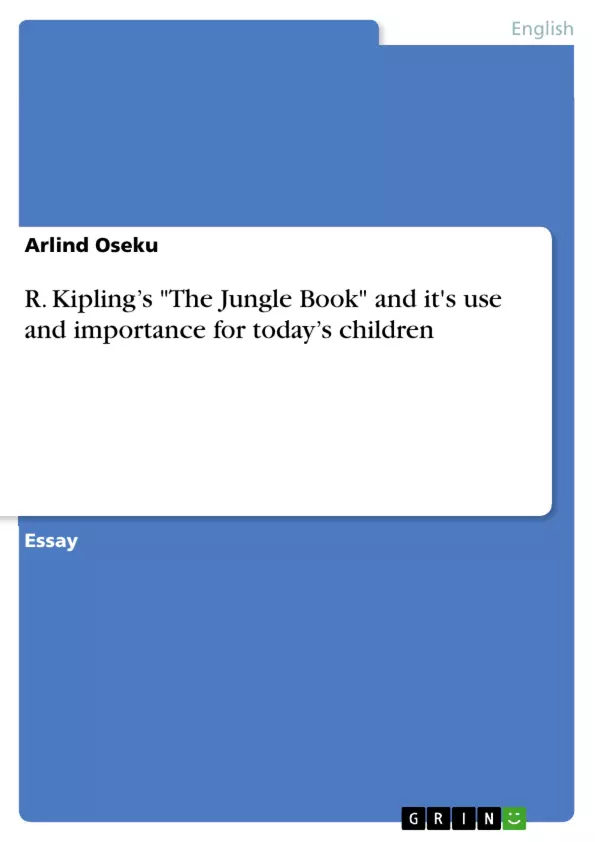In the following text I will explain you why Rudyard Kipling’s The Jungle Book (1894) is still useful and important for today’s children although it is very old and often is read by adults with pleasure as well. Therefore I will give you some examples from the book and show you to what extent children can learn from these stories.
Table of Contents
- R. Kipling's The Jungle Book is still useful and important for today's children
- The Jungle Book - Basic Information
- The Jungle Book - Important Information for Children
- Important Topics for Children
- Mowgli's Brothers
- Kaa's Hunting
- Tiger- Tiger!
- Human and Animal Relationship
- Conclusion
Objectives and Key Themes
This essay explores the enduring relevance of Rudyard Kipling's The Jungle Book for contemporary children. By analyzing key themes and scenes within the text, the author argues that the book offers valuable lessons for young readers, promoting their understanding of societal rules, the importance of friendship, and the consequences of one's actions.- Importance of societal rules and values
- The role of friendship and trust
- Consequence of actions and responsibility
- Importance of self-control and temper management
- Understanding the relationship between humans and animals
Chapter Summaries
The essay begins by introducing the main argument: Rudyard Kipling's The Jungle Book remains relevant for today's children despite its age. The author highlights the importance of the stories within the book in helping children develop a sense of community and learn valuable life lessons. The essay then delves into specific examples from the book to illustrate its educational value. For instance, the scene involving Tabaqui, Father Wolf, and Mother Wolf in "Mowgli's Brothers" demonstrates the importance of abiding by societal rules, even in a jungle setting. The quote from Father Wolf, “He has no right! By the Law of the Jungle he has no right to change his quarters without due warning,” highlights the importance of respect for laws and regulations. The author further analyzes the story "Kaa's Hunting" to illustrate the concept of responsibility and the consequences of one's actions. The quote from Baloo, “Sorrow never stays punishment,” emphasizes the importance of facing consequences and learning from mistakes. The essay also highlights the importance of self-control, particularly in the story “Tiger-Tiger!” where Mowgli is reminded to control his temper when he is angered by younger children. Finally, the essay discusses the importance of understanding the relationship between humans and animals, using a scene from "Mowgli's Brothers" to demonstrate the difference between humans and animals. This scene emphasizes that children should be aware of the potential dangers of wild animals and how to react accordingly.Keywords
The key concepts of the essay revolve around Rudyard Kipling's The Jungle Book and its enduring relevance for children. The essay focuses on themes such as the law of the jungle, societal rules, friendship, consequences of actions, self-control, and the relationship between humans and animals. The author uses examples from the book, including scenes from "Mowgli's Brothers," "Kaa's Hunting," and "Tiger-Tiger!" to illustrate these themes.Frequently Asked Questions
Is Rudyard Kipling's "The Jungle Book" still relevant for children today?
Yes, the essay argues that despite its age, the book remains important as it teaches children about societal rules, friendship, and the consequences of their actions.
What can children learn from the "Law of the Jungle"?
The "Law of the Jungle" serves as a metaphor for societal rules and regulations, teaching children the importance of respect for community standards and laws.
How does the book address the concept of responsibility?
Through stories like "Kaa's Hunting," the book illustrates that actions have consequences, emphasizing that "sorrow never stays punishment" and one must learn from mistakes.
What lesson does Mowgli learn about managing his temper?
In "Tiger-Tiger!", Mowgli is reminded to maintain self-control and manage his temper, a valuable lesson for children's emotional development.
Why is the relationship between humans and animals highlighted?
The book helps children understand the difference between humans and wild animals, teaching them to respect the potential dangers of the natural world.
What are the key themes explored in this analysis of "The Jungle Book"?
The key themes include societal values, the role of friendship and trust, responsibility, self-control, and the relationship between humans and nature.
- Quote paper
- Arlind Oseku (Author), 2013, R. Kipling’s "The Jungle Book" and it's use and importance for today’s children, Munich, GRIN Verlag, https://www.grin.com/document/293594



